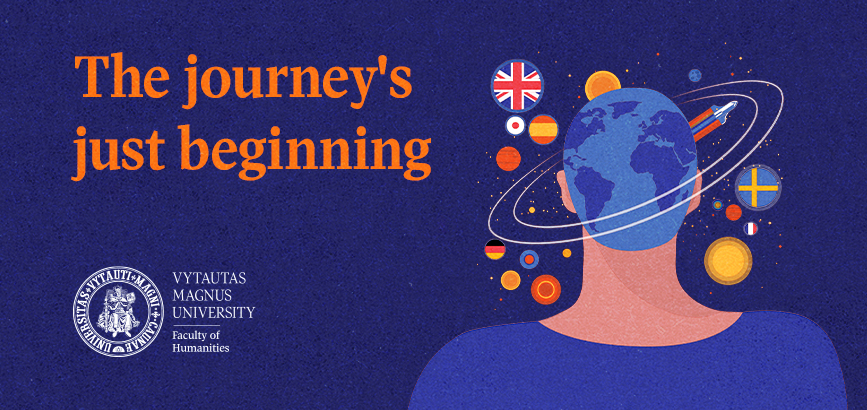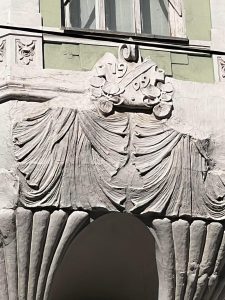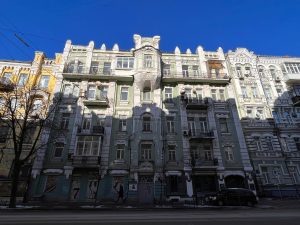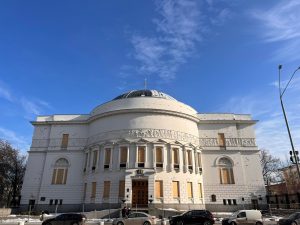Project “16 Days of Gratitude”: day 16
Day 16. A few months before the declaration of independence…
Well, here is the 16th day of gratitude and Lithuanian steps in Kyiv. Let us go back in time to September 21, 1917. The building of the Ukrainian Central Council (the former Pedagogical Museum) and the street are incredibly crowded. Today, the Congress of Enslaved Peoples of Russia is being held here. Among the almost 90 delegates from different nationalities, there are also 9 representatives from Lithuania who wish to talk about their future: Augustinas Voldemaras, Jurgis Byla, Vaclovas Bielskis (elected as one of the chairs of the congress), count Antanas Julijonas Gravrogkas, Juozas Tumas-Vaižgantas, Antanas Tumėnas, Stasys Čiurlionis, Juozas Jankevičius, Michail Markovsky (by the way, many of them had some connections with Ukraine; they had either worked here or studied). Almost from the first day, the representatives of the Lithuanian delegation insist in their speeches not on the federalization of Russia, but on the creation of their own independent state. This is confirmed in the speeches by Voldemaras and Belskis on the second and third days of the congress (September 22 and 23). As early as the beginning of June 1917, the Petrograd Seimas spoke in favour of the formation of a sovereign state within the ethnographic boundaries. The fourth day of the congress (September 24) is opened by Belskis and Voldemaras, elected to several commissions, among them, on the preparation of the resolutions of the congress. In the report, “The future federal structure of Russia”, these words, still relevant today, are proclaimed: “Thus, Russia’s efforts to expand its borders caused fear among the states of Western Europe. But they have long seen that Russia will not be able to stay the way it was. Sooner or later, it must change into a federal state, if it does not want to disappear“. This and several subsequent days of the congress are held in debates and discussions. On the seventh day (September 27), Voldemaras again takes the floor and in his speech, he once again notes that nationality must take over, otherwise stronger states will again take away the right to vote and does not agree with federalization. On the last, eighth day of the congress, after long discussions, a resolution “On the Lithuanian Affair” is adopted, which states, among other things “<…> the right of the Lithuanian people to form a sovereign Lithuanian state from parts of the Russian and Prussian Lithuania, as well as from the Lithuanian part of the Suwalki Governorate, subject to the principles of self-determination.” Thus, it was in Kyiv that the Lithuanian declaration of independence once again sounded loudly: the Lithuanian delegation was the only one with such aspirations in the congress. Although the decision of the congress could not be implemented, the established personal acquaintances that began in the capital of Ukraine contributed to the fact that Voldemaras (then the plenipotentiary representative of the Lithuanian National Council in Russia) participated in the Ukrainian delegation at the Brest peace negotiations. In Kyiv, at that time, discussions proceed on the creation of a separate Lithuanian National Council, which would “seek to obtain representation in Ukraine from the national bodies of Lithuania.” The representative office was officially registered by the Ministry of Foreign Affairs of the UNR on March 12, 1918. Thus, the Lithuanian National Council in Kyiv (located at 10 Bolshaya Zhytomyrska Street, apt. 6; the house has been preserved and is on the photo) became the first diplomatic mission of independent Lithuania in Ukraine, headed by an engineer Juozas Jankevičius.
There are still so many events I would like to tell you. I must admit that at the beginning of the project, I did not expect to find a lot of information about our relations, but now it seems that there are not enough days in a year to talk about our common past, and this is only in Kiev. Hopefully, all this will someday inspire new projects and cooperation ideas. Whether you are in Kyiv or elsewhere, everything is dear: the ancient stones breathe our common history, our tears and our laughter, our victories and defeats, because they taught us to become stronger. Here are our common shrines, our common heroes, we have someone to be proud of. During these sixteen days, we rose high above Kyiv, where the Lithuanian castle once stood, we walked around Podol, we rested in the shade of the cosy Lithuanian Square, we were as kind and fearless as an angel from Vilnius, we rebuffed all our enemies as the princes of Ostrozhsky did, we rebelled for our freedom, we learned from each other and brought the light of truth as our Kobzar and your Maironis did, we fought again, we spoke together about our independence and understood well what this means for us. And we are together again! Thank you for everything you do today for Ukraine, and, in this way, for each of us! We will win together! And may the independent and free Ukraine and Lithuania always live!
P.S. I would like to give special thanks to the incredible and wonderful team of Vytautas Magnus University: Jonas Vaičenonis, Jurgita Vaičenonienė, Ričardas Jaramičius, Greta Garnytė and all those who, one way or another, were involved in this project. Without you, this would not have been possible. I really hope that we will have many more new and interesting plans that we will realize together.
Dr. Ruslana Martseniuk
Photos by dr. Ruslana Martseniuk















